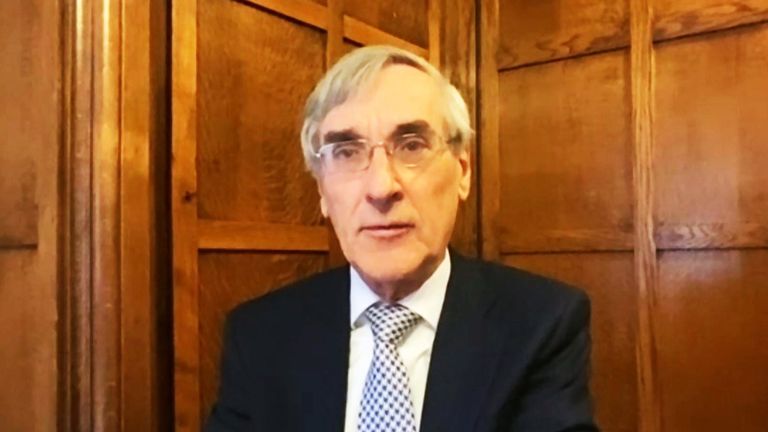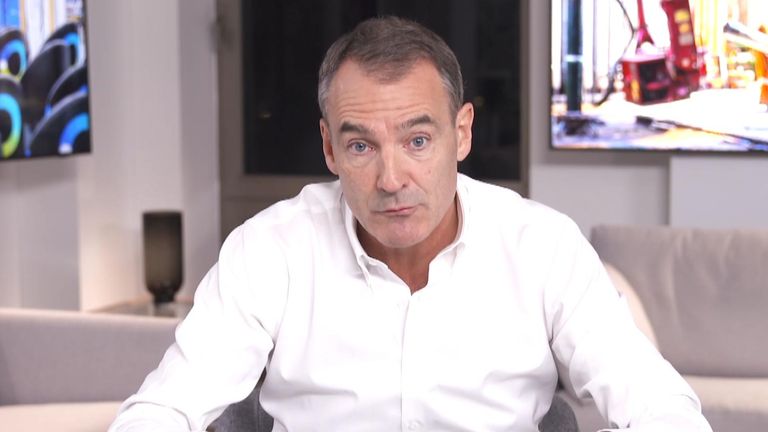Budget 2023: Corporation tax set to rise from 19% to 25% in April
Since the election of the coalition government in 2010, the direction of the rate of corporation tax levied in the UK has gone one way, until now.
The rate of corporation tax is set to raise from the current 19% to 25% at the beginning of the new tax year in one of the biggest reversals of tax policy of the last decade and a half.
It has sparked an enormous debate about the current government’s attitude to business – at the heart of which is whether or not low rates of corporation tax provide incentives for businesses to invest.
A 13 year debate
It is a debate that has been raging ever since David Cameron entered 10 Downing Street in 2010 as the first Conservative prime minister in 13 years.
Cutting corporation tax was a flagship policy of the coalition government he led and of subsequent Conservative governments.
A lot of credit for that goes to George Osborne.
In his first budget, in June 2010, Mr Osborne announced that the 28% rate he inherited from Alistair Darling would be cut by one percentage point each year from 2011 to 2014.
In the event, Mr Osborne went further than that. Corporation tax came down to 26% in 2011 and to 24% in 2012 before coming down to 23% in 2013 and 21% in 2014. It fell again to 20% in 2015.
When the Conservatives were elected outright later that year, Mr Osborne pledged to take it down to 18%, arguing that lowering corporation tax rates provided an incentive for businesses to invest in the UK.
His approach was summed up in his March 2016 budget speech: “All the evidence shows it [corporation tax] is one of the most distortive and unproductive taxes there is.”
He subsequently promised to carry on cutting the rate of corporation tax to 17% by 2020.
Unfortunately for Mr Osborne, he left office following the Brexit vote, although in his final days in the Treasury he indicated that the rate would be cut to just 15% or even lower as part of a post-Brexit push for growth.
Read more from business:
Hospitality chief urges Shapps to overhaul Ofgem powers amid energy squeeze
Hundreds of thousands of small businesses ‘may fold this year’
Car industry expects almost 500,000 EV sales this year as demand spikes
His successor, Philip Hammond, quickly distanced himself from that and, while not announcing any reductions to the rate himself, remained committed to the 17% target.
Accordingly, corporation tax was reduced from 20% to 19% at the start of the 2017-18 tax year.
That was as low as it got as the government was forced to put tax-cutting plans on hold in the wake of the pandemic.
What has gone less widely reported about Mr Osborne’s approach, in particular, is that, while he cut the headline rate of corporation tax, investment allowances remained, in the words of the Institute for Fiscal Studies, “amongst the developed world’s least generous”.
As a result, as the IFS and others have pointed out, the amount of corporation tax raked in by the government as a proportion of GDP has barely moved.
In fact, perhaps proving Mr Osborne’s point, it even went up at various times.
Corporation tax as a proportion of UK GDP rose to 2.9% in 2019-20, its highest level since before the global financial crisis more than a decade earlier, but then sank to 1.8% in 2021-22 as company profits were crushed during the pandemic.
The case for cutting
The case for cutting corporation taxes is that it stimulates growth.
Supporters of such cuts point to the Republic of Ireland which, having had a corporation tax rate of just 12.5% since 2003, has become a magnet for overseas investment from the US tech giants in particular.
As David Gauke, a former Treasury minister under Mr Osborne, put it in a 2021 speech: “Corporation tax is essentially a tax on investment returns. If you reduce the rate of return on your investment, all other things being equal, you will get less investment.”
But not everyone is convinced by that and the sceptics, apparently, include Rishi Sunak.
Sceptics
As chancellor, it was he who announced plans to raise corporation tax from 19% to 25% in his March 2021 budget, largely as a way of filling the black hole in government finances created by the pandemic.
He said at the time: “The government is providing business with over £100bn pounds of support to get through this pandemic so it is fair and necessary to ask them to contribute to our recovery.”
Mr Sunak sugared the pill with a ‘super deduction’ to encourage businesses to invest.
His plans were temporarily reversed by Kwasi Kwarteng but now, with Mr Sunak in Number 10, the increase is going ahead again – even though the chancellor, Jeremy Hunt, supported actually cutting corporation tax to 15% during his campaign to become Conservative leader.
Yet even some business people are sceptical that lowering corporate taxes stimulates investment.
They include Sir Martin Sorrell, the advertising mogul, who wrote in The Times after the mini budget in October last year: “Cutting corporation tax does not stimulate investment. It might help, but it does not create investment.
“Cutting corporation tax does have a modest effect in increasing the discounted present value of future cash flows and so it could push a marginal project into positive territory but it is ludicrous to suggest that lower taxes will stimulate investment when the cost of funding that investment has gone from 1% or 2% to 6%.
“What really determines investment is the certainty of the business environment and right now the UK is a very uncertain place.”
What is beyond dispute is that the UK has a pretty miserable record in business investment.
In 2019, of countries in the OECD (Organisation for Economic Cooperation and Development), only Greece and Luxembourg came below the UK in a ranking of corporate investment as a proportion of GDP.
Countries like Japan and France, despite their higher levels of corporation tax, enjoy levels of business investment considerably above the OECD average.
No investment incentives
But also beyond dispute is that, by raising the rate of corporation tax without improving investment allowances, Messrs Sunak and Hunt are playing with fire.
There have been no indications, to date, that the government will look to sweeten the forthcoming tax increases with increases in investment allowances – something Mr Sunak has argued in previous speeches do more to incentivise investment than cuts to corporation tax.
:: Listen and subscribe to The Ian King Business Podcast here.
And this is a crucial point.
When the UK’s low corporation tax rates are combined with its comparatively stingy investment incentives, the country has been in the middle of the pack when it comes to overall business taxation.
Raising corporate taxes while doing nothing to lift investment incentives will drive the UK down the league table of countries offering competitive business tax regimes.
All this comes at a time when the US government is offering increasingly generous incentives to businesses to invest and the EU is likely to have to respond.
Already, recent windfall taxes imposed on the energy sector are doing a great deal of harm, with Shell’s new chief executive telling The Times today that the US was now “significantly” ahead of the UK in terms of offering business incentives, while executives from seven top wind farm companies have written to the chancellor urging him to reverse a recent tax raid on electricity generators, which they say is making it harder to attract private investment to Britain.
Mr Hunt has a good opportunity next week to prove he has taken on board these warnings.
For all the latest business News Click Here




